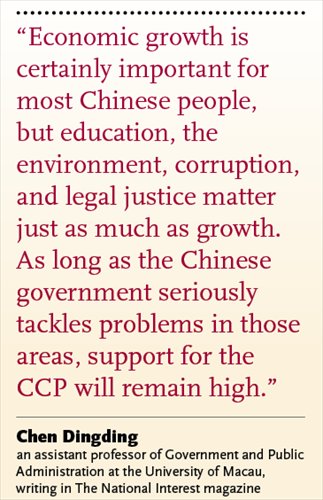In face of challenges, CPC reconnects with grass roots
As the Communist Party of China (CPC) celebrates the 95th anniversary of its founding, it is expected to become more legitimate, more effective and stronger as it meets future challenges, debunking some critics' predictions of a coming collapse.

A teacher lectures on the history of the Communist Party of China at Red Flag Elementary School in Chongqing, June 28. Photo: IC
Communist Party of China (CPC) committees from the neighborhood level up to provincial governments, from jails to universities, are organizing events and activities to mark the 95th anniversary of the founding of the Party.
In Beijing's Fangshan district a museum called "Without the Communist Party there would be no new China" (also the name of a famous red song) uses the latest technologies like virtual and augmented reality to showcase the Party's history, according to the Beijing Youth Daily.
The Party committee of the city jail of Wuwei, Northwest China's Gansu Province, organized contests to test the guards' knowledge of the Party's constitution; integrity and self-discipline guidelines; and disciplinary measures, the Legal Daily reported. Yan Qinglin, the jail's Party secretary, said he hoped the contests will make Party members working in the jail more motivated to study the CPC's rules and regulations.
In Qufu, East China's Shandong Province, over 200 primary and middle school students participated in a red song singing contest in Tianjiabing Primary School, during which they sang songs like "Under the Chinese Dream" to commemorate the occasion.
Some Party members celebrated the anniversary by hand writing the Party constitution. In Tongxiang, Eastern China's Zhejiang Province, for example, over 40,000 Party members participated in a campaign to copy the Party constitution over 95 days to celebrate the CPC's anniversary. Party members claim the practice revives their pioneering spirit and boosts their pride. "Now, copying the Party constitution has become my habit," Yan Xiaoting, a Party member working at a Zhejiang company, told Jiaxing Online.
In Julu county, North China's Hebei Province, 78-year-old Party member Zhang Moxian spent 30 days copying a 52-meter, 17,000-character long Party constitution to show his faith in the CPC.

Alive and well
The past 95 years have seen CPC grow from a small party with only 50-odd members, to the world's biggest governing party with 88 million members. Over the 67 years of CPC rule, China has evolved from a mostly rural, underdeveloped country to the world's second largest economy, with total GDP of over $1 trillion. Over 600 million people have been lifted out of poverty, development of science and technology has leapt forward, and China is now able to compete with developed countries as it continues to make breakthroughs such as launching manned spaceflights and deep-sea research submersibles.
Many foreign politicians and experts are known to badmouth the CPC. Some used to assert that the CPC would not be able to feed China's massive population. After the Reform and Opening-up, many voices started to predict that the Chinese government would be blown over by the winds of change.
David Shambaugh, professor of international affairs and director of the China Policy Program at George Washington University published a book China's Future, in which he predicted the eventual decline of the CPC unless certain reforms are taken.
"It is no secret that China has reached a series of key turning points on its developmental path and dramatic national transformation ... Diminishing returns have set in and it has become plainly evident that the main elements of the broad reform program first launched by Deng Xiaoping in 1978 are no longer applicable or sustainable for spurring China's continued modernization over the next decades," he told The Diplomat.
Stephen Harner, former US Foreign Service Officer who served in Beijing and a Forbes contributor, rejected his view completely. Responding to Shambaugh's claims regarding tighter control by the CPC, Harner said, "It is rational and responsible statecraft and leadership, firmly in China's political tradition, to enforce a certain focus on messages and themes that positively advance the reform agenda."
He wrote further: "The economy and society have developed and hundreds of millions of people prospered within this system. It is almost impossible to imagine - given Chinese culture and tradition - a different system. And, to judge by examples in Taiwan, elsewhere in Asia and, indeed, in the United States, it is highly doubtful that the accoutrements of a democratic pluralism that he cites would make any material difference."
"For this reason alone, the most likely outcome of which is a much stronger, more legitimate, and more effective CCP and government at all levels."
Chen Dingding, an assistant professor of Government and Public Administration at the University of Macau, wrote that the belief that an economic slowdown will lead to political disruption is based on the belief that the Chinese government's legitimacy relies solely on economic performance.
"Unfortunately this assumption, though widely held among scholars, is no longer true. Economic growth is certainly important for most Chinese people, but education, the environment, corruption, and legal justice matter just as much as growth. As long as the Chinese government seriously tackles problems in those areas, support for the CCP will remain high," he wrote in The National Interest magazine.
Many Westerners have predicted China's collapse because they don't understand how China's political system works, thinking that only their system is democratic.
But Xie Chuntao, director of the Party History Teaching and Research Department at the Party School of the Central Committee of the CPC, says democracy has different expressions in different countries and regions with different cultures, traditions and levels of social development. For example, the UK's EU referendum is democratic because the decision to leave the EU was made not by the governing party, but the people. However, the Brexit decision may also cause Britain to go backward and harm the country's development.
In an interview with People's Daily, Xie said China's form of democracy is consultative. Decisions are made on the basis of consensus through consultation. "This is the characteristic of Chinese democracy. I think it's better than the simple practice of the minority subordinating to the majority," Xie told People's Daily.
Xie said the support of the masses is the main reason why the CPC has been able to be the governing party of China for 67 years. People support the Party because it represents the interest of the country and the public.
Strengthening discipline
The CPC's 95th anniversary means China only has five years left to achieve its goal of becoming a "moderately well-off society" by 2020, right ahead of the 100th anniversary of the CPC.
As China's economy enters a new era characterized by slower growth and painful restructuring, pessimistic views about China's future are rising again in the international community. Xie says the CPC faces a series of challenges in the future including fighting pollution, strengthening China's legal system and diplomatic policies. But corruption, which the CPC has taken great pains to address, remains a big problem which they believe may threaten the very survival of the Party and the state. "Strengthening Party discipline" is a must for the CPC to survive.
This year, in addition to its anti-corruption campaign which is targeting higher officials in the Party, the CPC Central Committee launched Party-wide campaigns to boost the discipline of its members.
In February, the CPC launched a massive campaign entitled "Two studies and one becoming," requiring all members to study the Party's constitution and speeches made by the current and former top leaders, and become qualified members of the Party.
According to its education plan, issued by the General Office of the CPC Central Committee, the campaign aims to solve a series of problems that exist among Party members including a wavering faith in communism, low Party awareness, lack of understanding of the Party's principles and moral issues.
"The campaign is an important measure to push Party education from concentrating on just a few key members to the masses, and from concentrated education to common education," according to the document.
Apart from studying the Party constitution and speeches, the plan also encourages all Party members to learn lessons from the downfall of corrupt top officials like Zhou Yongkang, Bo Xilai and Ling Jihua.
The plan also outlines detailed measures, such as discussions, courses on the Party, meetings on Party committees' problems and democratic peer reviews. It also requires Party committees to celebrate the CPC's 95th anniversary by organizing courses on the Party and awarding outstanding Party members, officials and committees.
"The campaign will further unite people's thinking, close the relations between the Party and the public, and purify and strengthen the Party, providing a … strong guarantee for the Party's 95th anniversary," Chen Hongcai, vice director at the public administration department of Zhejiang's provincial Party school, told Zhejiang Daily.
Global Times
Newspaper headline: Party rejuvenation